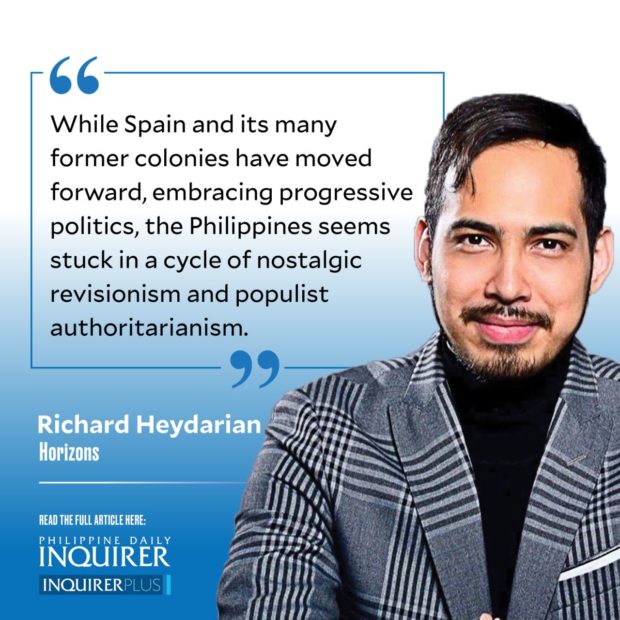Tiktokpolitik: Marcos Jr.’s nostalgic populism
BARCELONA — In his first encounters with Europe, Rizal found reassuring familiarity. Upon arriving in Barcelona in 1882, the Filipino revolutionary wrote, “I walked along those wide, clean streets, macadamized as in Manila,” feeling at home in the continent of empires. To be fair, Rizal lamented how “no one” recognized him as a “Filipino,” since the Philippines was yet to fully register on the consciousness of the Western world, including Spaniards.
I was drenched in the same sense of familiarity upon visiting Barcelona last week, a magical city where I decided to spend my birthday. And thankfully, I got mostly affirmative reactions whenever I mentioned that I’m from the Philippines when it became clear from my (broken) Spanish that I wasn’t either from Latin America or Spain.
Yes, Barcelona is a city of art and history, nurturing world-renowned artists such as Pablo Picasso and Antoni Gaudí. But it’s also a cradle of radical politics, hosting countless labor union leaders and Marxists at the turn of the century, which deeply influenced a whole generation of Filipino revolutionaries and thinkers. As Isabelo de los Reyes, a key progressive figure in Philippine history once put it, “[I] took advantage of the occasion to put into practice the good ideas I had learned from the anarchists of Barcelona.”
The political scientist Benedict Anderson famously argued that Rizal’s main character in “El Filibusterismo,” Simoun, reflected the author’s growing familiarity with radical politics, especially anarchism, which thrived in largely rural, Catholic-majority countries of Europe a century ago. After all, Anderson explains, anarchism’s irreverent “emphasis on personal liberty and autonomy … its penchant for vitriolic rhetoric, made its appeal especially great under political conditions of severe repression by rightwing regimes.”
Visiting Spain, however, is not only a nostalgic journey down the memory trail. It also presents what Rizal described as “el demonio de las comparaciones”—the specter of comparison. And this brings us to the radically different trajectory of Spain and its former colony. While Spain is steadily transcending the dark days of Francoist Dictatorship, the Philippines is embracing the scion of a former dictator with gusto.
While meticulously preserving its architectural legacy and cultural heritage, today’s Spain has thoroughly moved forward from and transcended its authoritarian past. In stark contrast, the Philippines, a former colony, is bedeviled by authoritarian nostalgia, while largely ignoring its own history and cultural heritage. Barcelona has echoes of its ancient glories. Today’s Manila is nothing like what it used to be, namely “Perla del Oriente” (Pear of the Orient).
The contrast is even more poignant in the realm of politics. While the Socialist Workers’ Party is in charge of Spain nowadays, the Philippines has become a hive of Red-tagging and demonization of progressive politics. Spain decided to exhume the remains of its former dictator, Francisco Franco, not long after the Duterte administration granted a hero’s burial to a former dictator.
After rejecting authoritarianism four decades ago, Spain has transformed into among the most prosperous and progressive nations on earth. Its democracy is vibrant and largely forward-looking, driven by intense political conversations, ideological debates, and inter-party contestation.
In the Philippines, meanwhile, the sole son of a former dictator is steadily cruising toward victory by largely avoiding contentious issues, detailed policy discussions, and public debates, except those organized by friendly platforms.
At the most fundamental level, Ferdinand Marcos Jr. is trafficking in the politics of nostalgia, appealing to imagined glories of the past and tapping into public yearning for a steady hand after years of dizzying incompetence and economic crises.
Avuncular and charming, the former senator projects a “cool,” relatable, and anodyne image across major social media platforms, most especially TikTok. In just a few seconds, or at most handful of minutes, the Chinese social media platform allows candidates such as Marcos Jr. to directly appeal to the younger generation via carefully-curated videos, which place spectacle above substance. If current trends stand, we may soon have our first “vlogger president” in Malacañang.
But to paraphrase the Spanish writer George Santayana, those who ignore the dark past are condemned to avoid a bright future. While Spain and its many former colonies have moved forward, embracing progressive politics, the Philippines seems stuck in a cycle of nostalgic revisionism and populist authoritarianism.





















